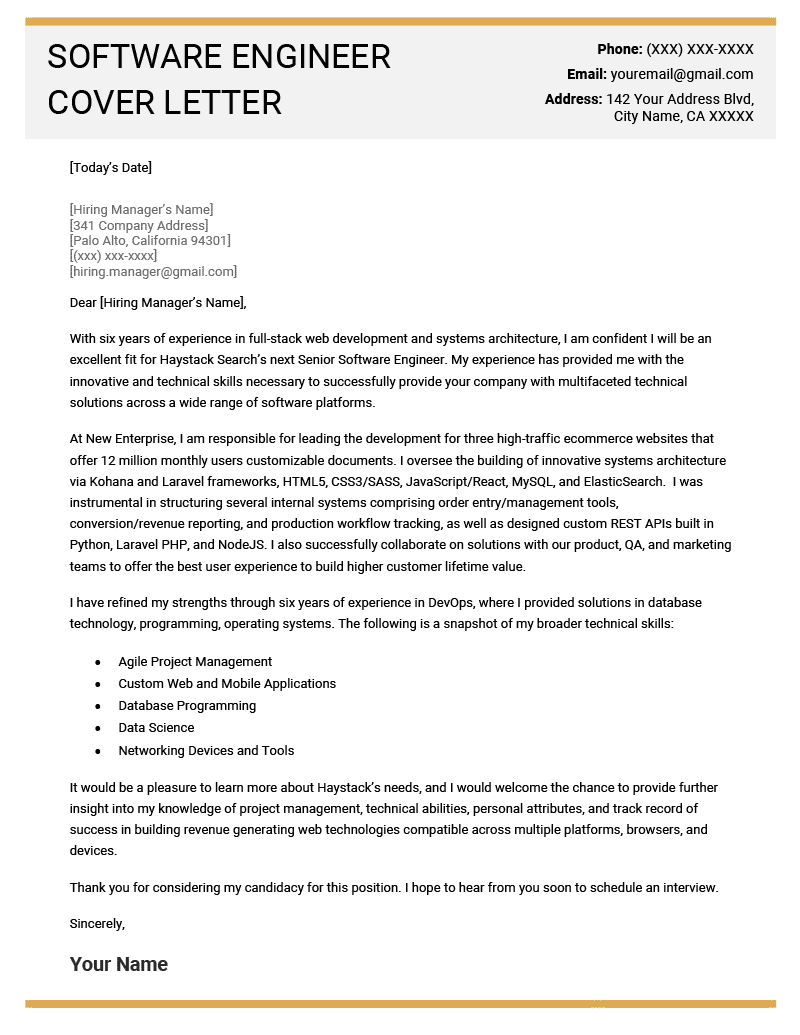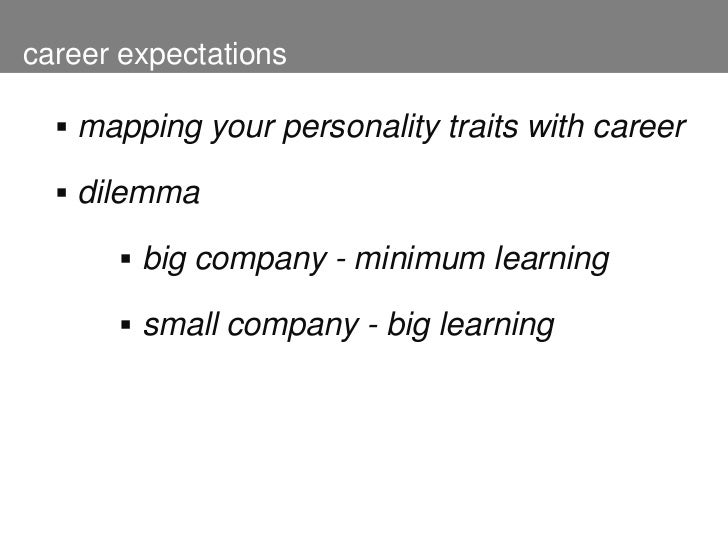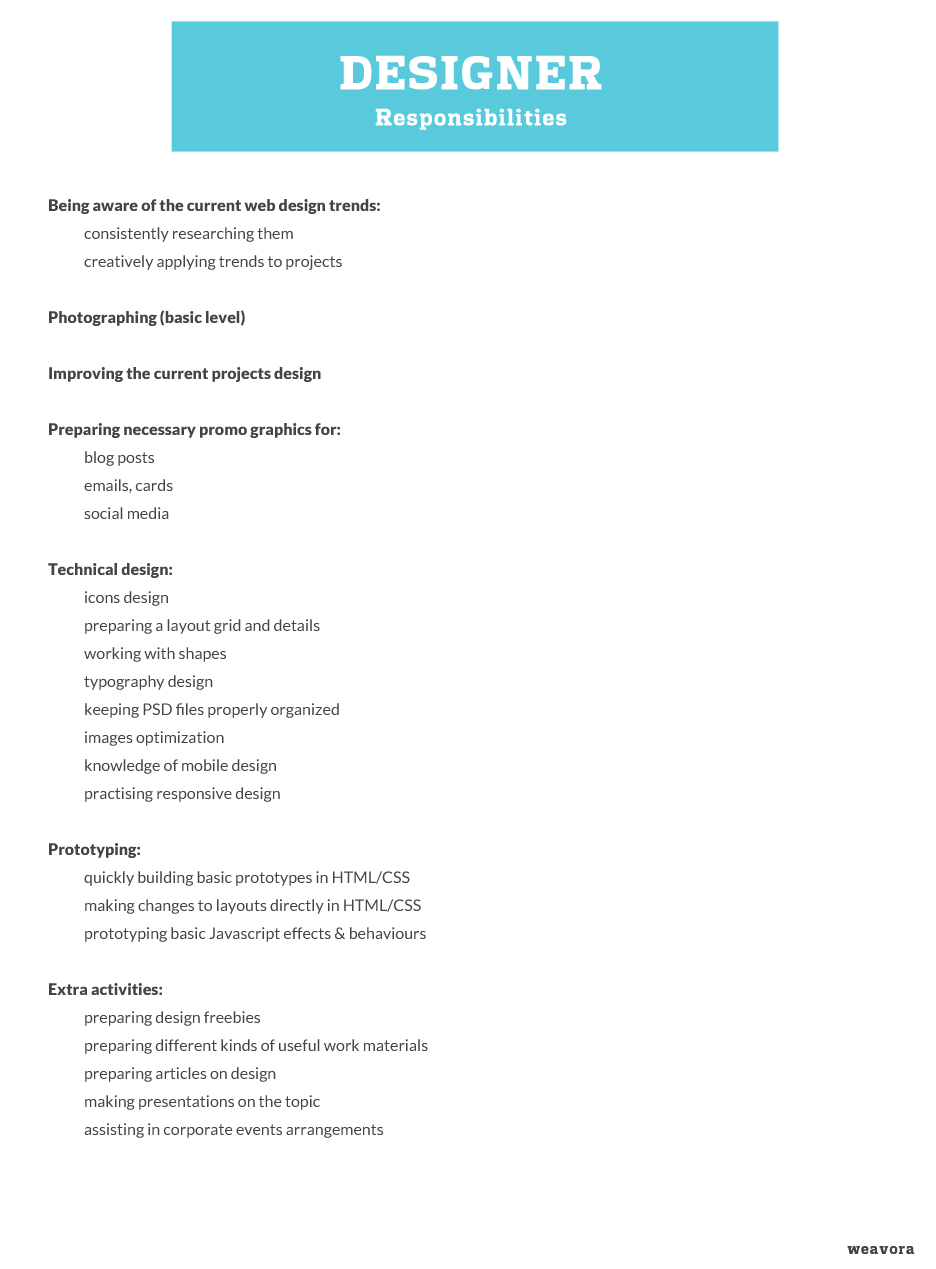Congratulations! You’ve landed yourself an interview after weeks of job searching.
To become a Lead Graphic Designer in ABC Company in the next 3 years. To achieve this, I will. Engineering Management. Takes responsibility for their team and product. Balances strategic and tactical goals. Works well with their team, other engineering teams, and the company at large. Knows the entire product, how customers use it, what they want, and where it should go. Inefficiently prioritizes tasks and projects.
The only thing left to do is make a good impression on the interviewer. Leave a good impression during the interview, and start your new job next week!
The key to a successful interview, however, lies in preparation.
- Some Examples of Career Aspirations for Different Positions Career Aspirations for Software Engineer Experienced software developer seeking a position in a challenging work environment which demands teamwork efforts for learning, research, and development of high-end software products Career Aspirations Sample for Teacher.
- If you don’t know what your career goals and aspirations are yet, focus on your ability to do the job instead. Examples of the Best Answers This is your chance to tell the interviewer where you see yourself in the future and how this job will help you achieve your career goals and aspirations.
Prepare for the interview ahead of time (with our most common interview questions!), and avoid making these interview mistakes.
CV Sample Download Form – Blog Article
Why Interviewers Ask “What are Your Career Aspirations?”
“What are your career aspirations?”
This is a very common question to ask during the interview. It is open-ended, allows the interviewer to catch a glimpse of your career goals, and allows you to let your passion shine!
But… why do interviewers ask this?
What are interviewers looking for when they ask, “What are your career aspirations?”
This question may appear in a variety of formats, such as:
- Where do you see yourself in 5 years from now?
- What advances are you looking to make in your career?
- What are your goals for your future?
Despite their differences, they share a common goal: Interviewers ask them to identify if you are a good fit for the company.
How to Answer “What are Your Career Aspirations?”
In your answer, you should:
- Be honest about your passions and career aspirations.
- Align your passions and career aspirations with the company’s values and services.
- Emphasise growth, and outline examples of how working in the company can lead to your personal growth.
- Show enthusiasm for the role. Natural enthusiasm and passion reflects dedication for the role. Passion is also contagious! Employers are more likely to hire someone enthusiastic and dedicated to the job.
Defining Career Aspirations vs Career Goals
Career Aspirations and Career Goals may often be used interchangeably. However, they aren’t the same thing!
Aspirations are long-term goals. They act as markers and destinations along your career journey.
Meanwhile, goals are short-term action items. They are the stepping stones you conquer along the way to achieve your career aspiration.
An example of a career aspiration is to hone your interpersonal skills as a social worker, to help the elderly achieve a better quality of life. To help fulfil that aspiration, one goal would be to get a job with a non-profit organization. Another goal would be to attend a class to learn a new language, such as Cantonese or Teochew.
How to Identify Your Career Aspirations

With that said, how do you identify your career aspirations?
Having a hard time thinking of answers on your own? Here are a few further steps you can take to identify your personal aspirations.
Reflect and Question Yourself
Start by thinking about why you wanted this job in the first place.
- What is important in your life?
- What do you like to do?
- Which work areas are you good at?
- Which work areas are you not good at?
- What are your personal strengths and weaknesses?
Write these answers down in a journal. Reflect on your career aspirations and progress regularly. Set some career goals to meet these aspirations.
Review Your Resume
Take a look at your current resume. Does it accurately reflect your career history?
If not, it’s time to update your resume.
Showcase your strengths and accomplishments in your resume. Include more skills in your resume. Optimise your resume by crafting a unique career narrative, and playing up your achievements.
Ask yourself:
- If you could add one thing to your resume, what would it be? An area of improvement in your career could be a potential career aspiration to strive towards.
- How can you improve your skillsets? Are there any skills you’ve always wanted to develop even further? Your answers could form the goals you need to conquer to work towards this larger aspiration.
Create an Individual Development Plan
You’ve identified some goals and some of your aspirations are in life. Great!
With these goals and aspirations in mind, design an Individual Development Plan.
An Individual Development Plan is a how-to guide to reach a single aspiration. It can help you align your career aspirations with the advertised job.
During your interview, focus on an aspiration that is relevant to your career. This way, you can explain to the recruiter how your personal development will work well alongside their company.
Creating an Individual Development Plan is simple:
- At the bottom of the page, write down your aspiration.
- Working backwards, write all the actionable steps – goals – you need to do to get there. This can include promotions, client acquisitions, or major projects.
- As you write, think about how the company you’re interviewing for impacts these goals. How can the company help you meet your personal career goals? Where can they aid in your development?
- Write down every goal until you get to “get hired by [the company you’re applying for]”.
Avoid aspirations such as a salary, location, or the company itself in your Individual Development Plan. Getting hired by the company can be your first goal, but should never be your end aspiration.
And voila! You have your Individual Development Plan, tailored to your ideal company.
Example of a Good Response with an Individual Development Plan
A sample career aspiration would be to get promoted to a Senior Brand Manager. Imagine the satisfaction you could get from overseeing a portfolio of projects, or managing a set of key accounts! However, promotion to Senior Brand Manager role is the career aspiration. The long-term result. An individual development plan charts your roadmap to achieve this role.
A sample plan is below:
The Individual Development Plan would be as follows:
- Get hired by XYZ Company
- Learn company’s customer service approach
- Master customer service approach by getting positive customer reviews
- Identify potential customer service improvements
- Suggest places of improvements to senior management
- Lead customer experience improvement project
- Get promoted to Brand Manager
- Lead small branding teams to drive big results
- Get promoted to Senior Brand Manager
With this Individual Development Plan established, you can answer “What are your Career Aspirations” in a more detailed, insightful manner. A sample career aspiration answer during an interview could be:
“I would like to merge my work experience and degree to create a unique customer experience with XYZ Company. My background in sales and buying will generate business profit. My team building skills will unite the customer experience as one company and one face. As I continue to develop, I envision myself enhancing customer experiences with business strategies, branding, marketing, and sales.”
Doesn’t this answer sound so much more insightful and driven? The candidate has a clear career aspiration in place, and a solid plan to get there!
To sum up, here’s how to identify your career aspirations, and prepare well for your interview:
- Ask yourself why you want this job
- Review your industry and skill sets
- Create your individual development plan
Then, ace that question in the interview!
Conclusion
We hope this article has inspired you with better responses to answer “What are your Career Aspirations?” during an interview! If you’re struggling with identifying your career aspirations, take some time to reflect on the exercise in this article. Formulate your own Individual Development Plan. Your plan will guide your process to answer this question during an interview.
Best of luck!

P.S. if your interview goes well enough, here’s a simple guide on how to write a resignation letter, to ensure you leave your old job on a positive note 🙂
Return to Ultimate Singapore Job Search Hub
« Previous: 2 Societal, Global, and Professional Contexts of EngineeringThroughout the ages humankind has sought to divine the future, in the past by consulting the Delphic oracle, today by creating massive computer models. However, life has a habit of reminding us that our predictions are rarely accurate. Despite the fickle nature of events over time, two constants persist. One is that we continue to prepare ourselves for an uncertain future as we always have, and the second is a steady growth of the influence of technology in our lives.
Engineering, through its role in the creation and implementation of technology, has been a key force in the improvement of our economic well-being, health, and quality of life. Three hundred years ago the average life span was 37 years, the primary effort of the majority of humans was focused on provisioning their tables, and the threat of sudden demise due to disease was a lurking reality (Kagan et al., 2001). Today, human life expectancy is approaching 80 years in many parts of the world as fundamental advances in medicine and technology have greatly suppressed the occurrence of and mortality rates for previously fatal diseases and the efforts of humankind are focused largely on enhanced quality of life (Central Intelligence Agency, 2001). Only 150 years ago travel from the East Coast of the United States to the West Coast entailed a hazardous journey that took months to accomplish. Weeks were needed to transmit a letter from one coast to the other. Today, in the developed world, we take it for granted that transportation is affordable and reliable, good health care is accessible, information
and entertainment are provided on call, and safe water and healthy food are readily available.
Career Aspirations Examples For Senior Software Engineer
To be sure, there have also been negative results of technology. Pollution, global warming, depletion of scarce resources, and catastrophic failures of poorly designed engineering systems are examples. Overall, however, engineers and their inventions and innovations have helped shape the changes that have made our lives more productive and fruitful.
With the prospect of the exciting new developments expected to come from such fields as biotechnology, nanotechnology, and high-performance computing, the year 2020 can be a time of new choices and opportunities. The years between the present and 2020 offer engineering the opportunity to strengthen its leadership role in society and to define an engineering career as one of the most influential and valuable in society and one that is attractive for the best and the brightest. If we are to take full advantage of this opportunity, it is important to engage all segments of the population in a vigorous discussion of the roles of engineers and engineering and to establish high aspirations for engineers that reflect a shared vision of the future.
Our Image and the Profession
Without engineers working both in technical endeavors and as leaders who serve in industry, government, education, and nonprofit organizations, progress would stagnate. Engineering offers men and women an unparalleled opportunity to experience the joy of improving the quality of life for humankind through development of engineering solutions to societal problems. Many engineers pursue career paths in fields that are traditionally defined as engineering. However, a significant number use their engineering backgrounds as points of departure into other fields such as law, medicine, and business. The opportunities offered by an engineering education are multifold, and this is not fully realized by young people, their parents, counselors, mentors, and the public at large.
By 2020, we aspire to a public that will understand and appreciate the profound impact of the engineering profession on sociocultural systems, the full spectrum of career opportunities accessible through
an engineering education, and the value of an engineering education to engineers working successfully in nonengineering jobs.
While engineering is a rapidly evolving field that adapts to new knowledge, new technology, and the needs of society, it also draws on distinct roots that go back to the origins of civilization. Maintaining a linkage of the past with the future is fundamental to the rational and fact-based approaches that engineers use in identifying and confronting the most difficult issues.
We aspire to a public that will recognize the union of professionalism, technical knowledge, social and historical awareness, and traditions that serve to make engineers competent to address the world’s complex and changing challenges.
Engineering must be grounded in the fundamental principles of science and mathematics. This foundation supports the development of new knowledge and the creation of safe, reliable, and innovative technologies that advance society and the human condition. Solutions of societal problems require that these technologies be applied in innovative ways with consideration of cultural differences, historical perspectives, and legal and economic constraints, among other issues.
We aspire to engineers in 2020 who will remain well grounded in the basics of mathematics and science, and who will expand their vision of design through a solid grounding in the humanities, social sciences, and economics. Emphasis on the creative process will allow more effective leadership in the development and application of next-generation technologies to problems of the future.
Engineering has shown itself to be responsive to technological breakthroughs from within engineering and from other fields, although not always in the most timely fashion. From its first two subbranches, military and civil, it expanded early on in recognition of developments that led to mining, mechanical, chemical, electrical, and industrial engineering. This process has continued and is evidenced recently by the introduction of biomedical and computer engineering.
We aspire to an engineering profession that will rapidly embrace the potentialities offered by creativity, invention, and cross-disciplinary fertilization to create and accommodate new fields of endeavor, including those that require openness to interdisciplinary efforts with nonengineering disciplines such as science, social science, and business.
With technology becoming ever more pervasive in society, it is incumbent on the engineering profession to lead in shaping the ultimate use of technology and the government processes that control, regulate, or encourage its use.
By 2020 we aspire to engineers who will assume leadership positions from which they can serve as positive influences in the making of public policy and in the administration of government and industry.
The success of engineering is based on a deep reservoir of talented people. In the United States this wellspring has been nourished principally by drawing from a white male population.
We aspire to an engineering profession that will effectively recruit, nurture, and welcome underrepresented groups to its ranks.
The world faces significant environmental challenges in the future. At the same time there is great opportunity for engineering to serve as a force to help society solve the problems associated with these challenges. This requires a holistic understanding of economic growth and development in terms of the principles of sustainability. The present generation has the obligation to leave a legacy to those who follow so they can have the opportunity to appreciate the unrestrained beauty of nature, the full diversity of the world’s flora and fauna, and ancient and modern cultures and their artifacts.
It is our aspiration that engineers will continue to be leaders in the movement toward use of wise, informed, and economical sustainable
development. This should begin in our educational institutions and be founded in the basic tenets of the engineering profession and its actions.
Advances in communications, travel, and economics have created a world where no country is untouched by any other. In the United States the oceans that bound our coasts no longer insulate us from other nations. In this dynamic global economy and political environment, engineering must adjust to a new world view.
We aspire to a future where engineers are prepared to adapt to changes in global forces and trends and to ethically assist the world in creating a balance in the standard of living for developing and developed countries alike.
Engineering education and its nature have been debated for many years. Change typically comes in waves, often following from forces outside the education establishment. Fallout from the surprising success of the launch of the Russian satellite Sputnik led to reinforcement of the “engineering science” paradigm. The impacts of the recession of the early 1980s and subsequent reconstitution of the competitiveness of American industry and the dramatic failure of the space shuttle Challenger in the mid-1980s aided the movement toward more attention to quality principles and communication and teamwork skills. Presently, it is important that engineering education be reconsidered in a futures-based approach driven from within engineering.
It is our aspiration that engineering educators and practicing engineers together undertake a proactive effort to prepare engineering education to address the technology and societal challenges and opportunities of the future. With appropriate thought and consideration, and using new strategic planning tools, we should reconstitute engineering curricula and related educational programs to prepare today’s engineers for the careers of the future, with due recognition of the rapid pace of change in the world and its intrinsic lack of predictability.
It is appropriate that engineers are educated to understand and appreciate history, philosophy, culture, and the arts, along with the creative elements of all of these disciplines. The balanced inclusion of these important aspects in an engineering education leads to men and women who can bridge the “two cultures” cited by the author C.P. Snow (1998). In our increasingly technological society, this is more important now than in the 1950s when Snow identified the issue. The case can be made that an appropriately designed engineering curriculum today offers an education that is more well rounded than that obtained by students majoring in classical liberal arts, where technology is conspicuously absent from the field of study.
Our aspiration is to shape the engineering curriculum for 2020 so as to be responsive to the disparate learning styles of different student populations and attractive for all those seeking a full and well-rounded education that prepares a person for a creative and productive life and positions of leadership.
Central Intelligence Agency. 2001. Long-Term Global Demographic Trends: Reshaping the Geopolitical Landscape. Available online at: http://www.odci.gov/cia/reports/Demo_Trends_For_Web.pdf.
Kagan, D., S. Ozment, and F.M. Turner. 2001. The Western Heritage, 7th Edition. Englewood Cliffs, N.J.: Prentice Hall.
Snow, C.P. 1998. The Two Cultures. Cambridge, United Kingdom: Cambridge University Press.

